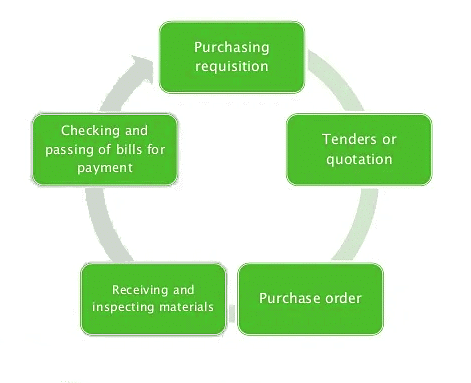Materials Purchase Procedure | Cost Accounting - B Com PDF Download
Determining Purchase Budget
The procurement manager compiles a purchasing budget for the upcoming fiscal year, collaborating with the production planning department. This budget encompasses specific details such as the quantity and quality of materials, timing of procurement, and the procurement sources. Additionally, a bill of materials, outlining the materials and components required for different tasks, is utilized to refine the purchase budget details. This bill of materials serves as a valuable tool for overseeing and managing the efficient use of materials.
Receipt of Purchase Requisition
The purchase officer takes steps to acquire materials only upon receiving a formal request for the same. Requisition slips detailing the required materials are submitted to the purchase department by the storekeeper and departmental heads. A purchase requisition serves as a formal document requesting the purchasing department to acquire materials.
The storekeeper generates this form for regular stock materials, while the departmental head does so for specific materials not regularly stocked. The storekeeper, aware of when new procurements are necessary, submits the requisition when materials reach the re-ordering level. Retaining a copy for future reference, the storekeeper ensures that the purchase requisition serves as the basis for placing orders for materials.
Determining Sources of Supply
The Purchase Manager maintains communication with multiple material suppliers, inviting quotations for specific items. Upon receiving these quotations, a comprehensive analysis is conducted to compare the terms and conditions offered. Factors taken into consideration encompass price, quantity, quality, delivery time, payment terms, trade discount, and the reputation of the suppliers. After a thorough evaluation of these elements, a conclusive decision is reached regarding the selection of the goods supplier.
Placing Order
Once a supplier is chosen, a formal purchase order is dispatched for the procurement of goods. This purchase order is conveyed through a printed form and is officially sanctioned by the purchase manager. The order should encompass specifics such as quantity, quality, price, mode of delivery, and payment terms. By issuing the purchase order, the vendor is authorized to dispatch the goods as stipulated within it. This document establishes a contractual relationship between the buyer and the vendor.
Follow-Up of Purchase Order
A purchase order typically includes a specified delivery date, and it is crucial for the organization that the goods arrive on time to maintain an uninterrupted flow of materials. Suppliers may be reminded of the scheduled delivery date, and it is essential to follow up on the purchase order to ensure timely receipt of stocks.
Receipt and Inspection of Materials
In large enterprises, the responsibility of receiving materials is delegated to the procurement department, while in smaller businesses, this duty falls upon the storekeeper. Upon unpacking the goods, their quantity is cross-checked with the information provided in the delivery challans. Any discrepancies in items are promptly communicated to the purchase department. Additionally, the specifications and quality of the goods are thoroughly examined at this stage.
Checking Invoices
Finally, the procurement department verifies the vendor-supplied invoices against its internal records. The quantity, quality, price, terms, and other details are cross-referenced with the information specified in the purchase order. Once a thorough examination is completed, the invoices are forwarded to the accounts department for payment.
 Purchasing Process
Purchasing Process
|
104 videos|131 docs|14 tests
|
FAQs on Materials Purchase Procedure - Cost Accounting - B Com
| 1. What is the importance of determining the purchase budget? |  |
| 2. How does the receipt of purchase requisition help in the materials purchase procedure? |  |
| 3. What are the sources of supply in the materials purchase procedure? |  |
| 4. Why is follow-up of purchase order necessary in the materials purchase procedure? |  |
| 5. What is the role of invoice checking in the materials purchase procedure? |  |




















